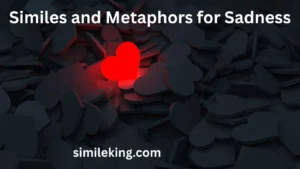When we talk about intelligence or a lack of it, we often need to use similes to express our thoughts in a way that doesn’t come off as rude or disrespectful.
While it’s easy to resort to calling someone “dumb” or using harsh phrases, there are many more creative and thoughtful ways to get your point across.
Similes—comparisons between two different things using “like” or “as”—offer a more nuanced way to express ourselves without sounding insulting.
In this article, we’ll explore over 15 similes for dumb, including alternatives that range from professional to casual, allowing you to adjust your language depending on the context.
Whether you’re texting a friend, addressing a colleague, or talking to someone you don’t know well, these phrases will give you the flexibility to communicate effectively while avoiding offense.
We’ll also break down when to use each one and how the tone impacts their reception.
1. Like a fish out of water
This simile is often used to describe someone who feels uncomfortable or out of place in a situation, making them appear clueless or unaware of what’s going on.
- Example: “When he tried to fix the printer, it was like a fish out of water—he just couldn’t figure it out.”
Tone: Neutral
Context: Informal, friendly
Use When: Describing someone who is inexperienced or unfamiliar with a task.
2. Like a deer in headlights
This is a common simile for someone who is stunned, unaware, or unable to react because they are confused or surprised.
- Example: “She looked like a deer in headlights when asked to present in front of the meeting.”
Tone: Neutral
Context: Can be used both casually or in a professional setting
Use When: Someone is caught off guard and unable to respond intelligently.
3. Like a broken record
While this simile doesn’t directly imply dumbness, it can be used when someone repeatedly makes the same mistakes or statements without realizing they’re not working.
- Example: “He’s like a broken record, always repeating the same thing but never learning from his mistakes.”
Tone: Slightly critical but not harsh
Context: Casual, sometimes used humorously
Use When: Someone keeps making the same errors without trying to improve.
4. Like a headless chicken
This simile describes someone who is acting in a frantic, disorganized manner, often as a result of confusion or lack of understanding.
- Example: “She ran around like a headless chicken, trying to get everything ready for the event.”
Tone: Informal
Context: Casual
Use When: Someone is acting in a chaotic, confused, or disoriented manner.
5. Like a squirrel trying to cross a busy road
This simile refers to someone who is clueless or unaware of the risks involved in their actions, often appearing to be making poor decisions.
- Example: “Trying to convince him to take on such a big project was like a squirrel trying to cross a busy road—he didn’t know what he was getting into.”
Tone: Neutral to slightly playful
Context: Informal
Use When: Describing someone who seems unaware of danger or difficulty.
6. Like a goldfish
Often used to imply short-term memory or a lack of awareness, this simile compares a person to a goldfish’s supposed limited memory span.
- Example: “He keeps forgetting what we talked about—he’s like a goldfish sometimes.”
Tone: Lighthearted or playful
Context: Casual
Use When: Someone keeps forgetting important details or has a short attention span.
7. Like a pancake in a frying pan
This simile describes someone who is out of their depth or making slow progress with little success.
- Example: “He looked like a pancake in a frying pan, trying to figure out the new software.”
Tone: Neutral
Context: Informal
Use When: Someone is struggling to grasp something and is looking a bit overwhelmed.
8. Like a hammer to a nail
This simile can be used to describe someone who is a bit too blunt or unaware of the right approach to a situation, usually because they lack understanding.
- Example: “Her approach to problem-solving was like a hammer to a nail—just too forceful and missing the mark.”
Tone: Critical but not harsh
Context: Casual
Use When: Someone is approaching a problem too forcefully or without the right tools.
9. Like a cat trying to swim
This simile describes someone who is uncomfortable or struggling with something they’re clearly unprepared for.
- Example: “His attempt at cooking was like a cat trying to swim—awkward and unsuccessful.”
Tone: Playful and humorous
Context: Casual
Use When: Someone is out of their element and struggling to succeed.
10. Like a bull in a china shop
This simile is used for someone who is acting clumsily or without regard for the delicate nature of a situation.
- Example: “He was like a bull in a china shop during the meeting—interrupting everyone and causing chaos.”
Tone: Mildly critical
Context: Casual or professional, depending on the situation
Use When: Someone is being unnecessarily forceful or careless.
11. Like a lost puppy
This simile can describe someone who is confused, helpless, or doesn’t know what to do, often in a way that evokes sympathy.
- Example: “He wandered around the office like a lost puppy, not sure where to go or what to do next.”
Tone: Sympathetic or understanding
Context: Casual
Use When: Describing someone who is feeling lost or out of place but in a non-judgmental way.
12. Like a phone without service
This simile is used when someone seems disconnected, unaware, or unable to contribute in a meaningful way.
- Example: “He was like a phone without service during the meeting—no input at all.”
Tone: Neutral
Context: Professional or casual
Use When: Someone is disengaged or out of touch with the situation.
13. Like a pencil with no lead
This simile suggests someone who is not functioning at their best, similar to an object that should have a specific purpose but is not effective.
- Example: “She felt like a pencil with no lead during the test, unsure of what to write or how to proceed.”
Tone: Light and neutral
Context: Informal
Use When: Describing someone who feels incapable or inefficient in a task.
Conclusion
Similes are powerful tools for communicating complex ideas, especially when discussing someone’s intelligence or lack of understanding. However, using creative and non-offensive similes helps maintain a respectful tone, whether in casual conversations, professional settings, or even texting. By choosing the right simile based on context, you can effectively express confusion, lack of awareness, or even clumsiness, all without sounding rude or judgmental.





